Books: The Star Wars Trilogy (Part III)

Welcome to the third and perhaps final Star Wars trilogy book review. (not sure if I'm going to do Episode I, II, and III book reviews).
The Return of the Jedi, by James Kahn, is by far the best of the three movie novelizations. The characters are developed to a point where it serves the fan of the films well to read it.
Right off the bat, the tone is set by Kahn's description of one of its minor characters, Moff Jerjerrod:
Jerjerrod -- tall, think, arrogant -- was the Death Star commander. He walked without hurry up the ranks of soldiers, to the ramp of the shuttle. Hurry was not in Jerjerrod, for hurry implied a wanting to be elsewhere, and he was a man who distinctively was exactly where he wanted to be. Great men never hurried (he was fond of saying); great men caused others to hurry.
It's a simple paragraph, but one that gives characters like these a real place in the story, something the movie does not try to do.
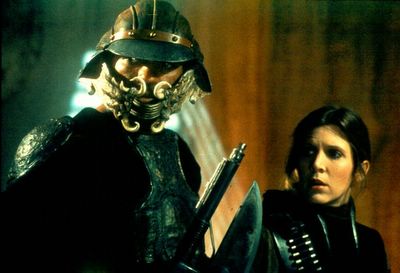
This storytelling device helps with the movie's major characters as well. When Lando Calrissian is disguised in Jabba the Hut's palace, his motivations are made clear:
Lando had managed to infiltrate this nest of maggots months earlier to see if it was possible to free Solo from Jabba's improsonment. He'd done this for several reasons.
First, because he felt (correctly) that it was his fault Han was in this predicament, and he wanted to make amends -- provided, of course, he could do so without getting hurt. Blending in here, like just one of the pirates, was no problem for Lando, though -- mistaken identity was a way of life with him.
Second, he wanted to join forces with Han's buddies at the top of the Rebel Alliance. They were out to beat the Empire, and he wanted nothing more in his life now than to do just that. The Imperial police had moved in on his action once too often; so this was a grudge match, now. Besides, Lando liked being part of Solo's crowd, since they seemed to be right up at the business end of all the action against the Empire.
Third, Princess Leia had aked him to hep, and he just never could refuse a princess asking for help. Bsides, you never knew how she might thank you some day.
Finally, Lando would have bet anything that Han simply could not be rescued from this place -- and Lando just plain couldn't resist a bet.
Character depth at its finest.
The description of Luke is in a simliar vein:
He was clad in the robe of the Jedi Knight -- a cassock, really -- but bore neither gun nor lightsaber. He stood loosely, without bravado, taking a measure of the place before entering. He was a man now. Wiser, like a man -- older more from loss than from years. Loss of illussions, loss of dependencey. Loss of friends, to war. Loss of sleep, to stress. Loss of laughter. Loss of his hand.
But of all his losses, the greatest was that which came from knowledge, and from the deep recognition that he could never un-know what he knew. So many things he wished he'd never learned. He had aged with the weight of this knowledge.
In the book, it notes that Luke, shortly after getting his hand chopped off, goes back to Ben Kenobi's old cave in Tattoine to make a new lightsaber; it also describes Han Solo's feelings while being in suspended animation, saying "it wasn't just sleepin', it was a big, wide awake Nothin'."

One of the reasons why I read the origial trilogy books was to mine foreshadowings of the new one to come, and Return of the Jedi offers one big, major one. It's not quite a spoiler, as it's in the book, but it's not something that was covered in the movie.
[If you don't want to know how Darth Vader came about, then skip this part (go on past the photo of the Emperor).]
Ben Kenobi, shortly after admitting to Luke that Darth Vader is his father, describes what happened to him years ago.
"You should not think of that machine as your father." It was the teacher speaking again. "When I saw what had become of him, I tried to dissuade him, to draw him back from the dark side. We fought...your father fell into a molten pit. When your father clawed his way out of that fiery pool, the change had been burned into him forever -- he was Darth Vader, without a trade of Anakin Skywalker. Irredeemeably dark. Scarred. Kept alive only by machinery and his own black will..."
Will Anakin fall into a pit? The movie trailer sure seems to imply it.
If you look really carefully at this photo below, a still shot from the recent Episode III trailer, shows a figure engulfed in lava. Is this Anakin/Vader? (Look at the very center of the photo). We shall see.

The subject of Leia was also explained in more detail:
"When your father left, he didn't know your mother was pregnant. Your mother and I knew he would find out eventually, but we wanted to keep you both as safe as possible, for as long as possible. So I took you to live with my brother Owen, on Tatooine...and your mother took Leia to live as the daughter of Senator Organa, on Alderaan."
So Owen Lars, show in Episode II, is Ben Kenobi's brother? Well, that's a part of the Star Wars saga ignored in the movie, as there's no mention of it that I can remember. That would make Anakin and Ben relatives by marriage. Odd.
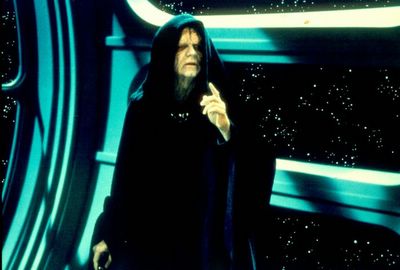
The character of the Emperor is given quite a bit of depth in the novel, shedding some light on his rise and his methods:
Emperor. It had a certain ring to it. The Republic had crumbled, the Empire was respledent with its own fires, and would always be so -- for the emperor knew what others refused to belive: the dark forces were the strongest.
He'd known this all along, in his heart of hearts -- but relearned it every day: from traitorous lieutenants who betryayed their superiors for favors; from weak-principled functionaries who gave him the secrets of local star systems' governments; from greedy landlords, and sadistic gangsters, and power-hungry politicians. No one was immune, they all craved the dark eneergy at their core. The Emperor had simply recognized this truth, and utlized it -- for his own aggrandizement, of course.
For his soul was the black center of the Empire.
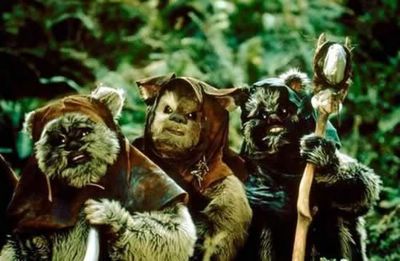
A notable plot difference from the book to the movie is that the Ewoks were very reluctant to help the Rebellion.
In the movie, C3PO tells the tribe of the dramatic story of the Empire, and they are immeidately willing to help. In the book, they say "Chief Chirpa says it's a very moving story, but it really has nothing to do with Ewoks." The Rebels cannot convince them of otherwise, until Wicket, the main character of the Ewoks, gives an impassioned, and quite frankly corny, speeach to his tribal coucil.
"Honorable Elders, we must aid this noble party not less for the trees, but more for the sake of the leaves on the trees."
Yeah, it's as bad as it sounds.

The emotions behind the Vader-Skywalker showdown are done in the way only a good novel can manage.
Luke it seemed, hoped to die long before he faced the Emporer:
He hoped Leia deactivated the deflector shield quickly, and destroyed the Death Star -- now, while all three of them were here. Before anything else happened. For the closer Luke came to the Emperor, the more anythings he feared would happen. A black storm raged inside him. He wanted to kill the Emperor, but then what? Confroont Vader? What would his father do? And what if Luke faced his father first, faced him and -- destroyed him. The thought was at once repugnant and compelling. Destroy Vader -- and then what. For the first time Luke had a brief murky image of himself standing on his father's body, holding his father's blazing power, and sitting at the Emperor's right hand.
That's good stuff. Too bad they didn't get that accross in the movie. The novel gets into the thoughts and dynamics of the three characters in the throne room in a way that makes very compelling reading.
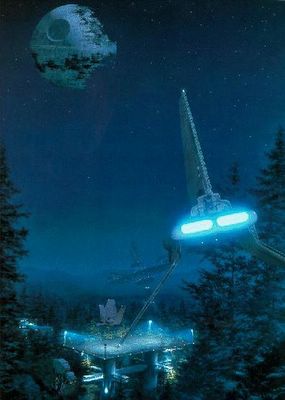
Another fun plot twist is that the Emperor, sensing that the Death Star's shield may be shut off, instructs the Death Star commander to destroy Endor, and all of its inhabitants (including Empire troops) if the shield goes down. It is one last source of character development for the commander, who dies with his battle station.
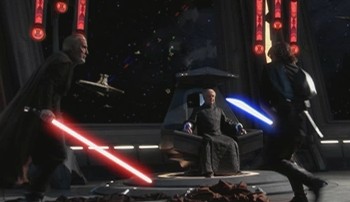
Again, this is by far the best novel of the three. It's is written better, and it clearly had the next three prequels in mind.
The time is coming!
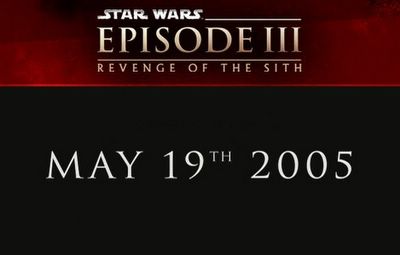
I can't wait!
RELATED LINKS:
More Books
Episode I Review
Episdoe II Review

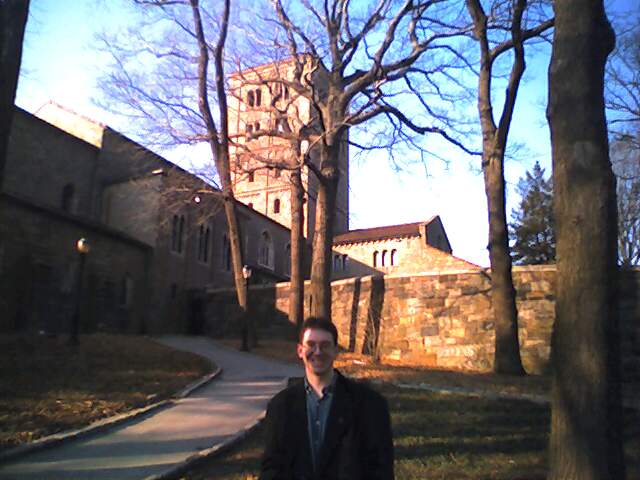

0 Comments:
Post a Comment
|<< Home